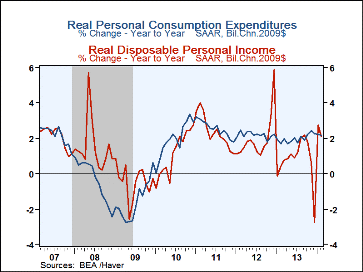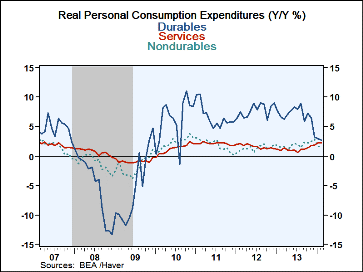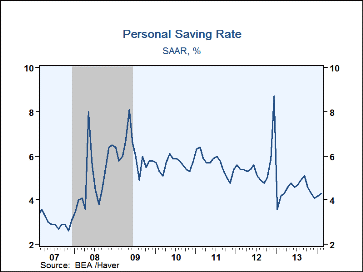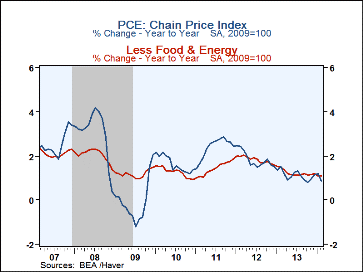 Global| Mar 28 2014
Global| Mar 28 2014U.S. Consumer Spending, Income and Saving Improve
by:Tom Moeller
|in:Economy in Brief
Summary
Personal consumption expenditures increased 0.3% (3.0% y/y) during February after a 0.2% January gain, revised from 0.1%. A 0.2% rise had been expected in the Action Economics Forecast Survey. Clothing purchases led the improvement [...]
Personal consumption expenditures increased 0.3% (3.0% y/y) during February after a 0.2% January gain, revised from 0.1%. A 0.2% rise had been expected in the Action Economics Forecast Survey. Clothing purchases led the improvement with a 0.9% rise (0.7% y/y), making up half of a 1.6% January drop. Spending on recreational goods jumped 0.7% (0.8% y/y) following a 0.1% uptick. Purchases of home furnishings & household equipment increased 0.5% (1.5% y/y), reversing most of a 0.4% January decline. Gasoline expenditures were unchanged (-6.4% y/y) after lower prices helped cause a 2.4% January fall. To the downside, motor vehicle outlays declined 0.4% (-1.0% y/y), off for the third consecutive month. Services outlays improved 0.3% (4.2% y/y) after a 0.6% increase, the rise paced by a 0.7% gain (6.4% y/y) in health care spending. Adjusted for inflation, PCE gained 0.2% (2.1% y/y).
Income growth fueled the gain in spending. Personal income rose 0.3% during February (3.1% y/y), the same as the unrevised January increase. The gain beat expectations for a 0.2% rise. Disposable personal income also increased a steady 0.3% (3.0% y/y). Wages & salaries improved a modest 0.2% (3.1% y/y) after a 0.3% rise. To the strong-side, Medicaid payments jumped 2.5% (10.0% y/y) following a 4.4% increase. Proprietors' income gained 0.6% (2.2% y/y) and rental incomes grew 0.5% (6.1% y/y). Also strong was dividend income which posted a 0.8% rise (5.1% y/y), but interest income fell 0.3% (+1.8 y/y) for a second month. Government unemployment insurance benefits were quite weak and fell 7.9% (-43.0% y/y). Adjusted for price inflation, disposable personal income improved 0.3% (2.1% y/y).
The personal savings rate improved to 4.3% but earlier figures were revised slightly lower. The savings rate remained close to its lowest since January 2008. The total amount of personal saving has been trending lower since 2009.
The PCE chain price index ticked up 0.1% (0.9% y/y) in February, the same as in the prior month. The price index excluding food & energy also rose 0.1% (1.1% y/y), for the eighth strait month. The y/y gain was the slowest since early-2011. Durable goods prices slipped 0.2% (-2.3% y/y) while nondurable goods prices were unchanged (-0.5% y/y). Prices for services gained 0.2% (1.9% y/y).
The personal income & consumption figures are available in Haver's USECON and USNA databases. The consensus expectation figure is in the AS1REPNA database.
| Personal Income & Outlays (%) | Feb | Jan | Dec | Y/Y | 2013 | 2012 | 2011 |
|---|---|---|---|---|---|---|---|
| Personal Income | 0.3 | 0.3 | -0.0 | 3.1 | 2.8 | 4.2 | 6.1 |
| Wages & Salaries | 0.2 | 0.3 | -0.1 | 3.1 | 3.1 | 4.3 | 4.1 |
| Disposable Personal Income | 0.3 | 0.3 | -0.1 | 3.0 | 1.9 | 3.9 | 4.8 |
| Personal Consumption Expenditures | 0.3 | 0.2 | 0.1 | 3.0 | 3.1 | 4.1 | 5.0 |
| Personal Saving Rate | 4.3 | 4.2 | 4.1 | 4.2 (Feb '13) |
4.5 | 5.6 | 5.7 |
| PCE Chain Price Index | 0.1 | 0.1 | 0.2 | 0.9 | 1.1 | 1.8 | 2.4 |
| Less Food & Energy | 0.1 | 0.1 | 0.1 | 1.1 | 1.2 | 1.8 | 1.4 |
| Real Disposable Income | 0.3 | 0.2 | -0.3 | 2.1 | 0.7 | 2.0 | 2.4 |
| Real Personal Consumption Expenditures | 0.2 | 0.1 | -0.1 | 2.1 | 2.0 | 2.2 | 2.5 |
Tom Moeller
AuthorMore in Author Profile »Prior to joining Haver Analytics in 2000, Mr. Moeller worked as the Economist at Chancellor Capital Management from 1985 to 1999. There, he developed comprehensive economic forecasts and interpreted economic data for equity and fixed income portfolio managers. Also at Chancellor, Mr. Moeller worked as an equity analyst and was responsible for researching and rating companies in the economically sensitive automobile and housing industries for investment in Chancellor’s equity portfolio. Prior to joining Chancellor, Mr. Moeller was an Economist at Citibank from 1979 to 1984. He also analyzed pricing behavior in the metals industry for the Council on Wage and Price Stability in Washington, D.C. In 1999, Mr. Moeller received the award for most accurate forecast from the Forecasters' Club of New York. From 1990 to 1992 he was President of the New York Association for Business Economists. Mr. Moeller earned an M.B.A. in Finance from Fordham University, where he graduated in 1987. He holds a Bachelor of Arts in Economics from George Washington University.
More Economy in Brief
 Global| Feb 05 2026
Global| Feb 05 2026Charts of the Week: Balanced Policy, Resilient Data and AI Narratives
by:Andrew Cates










